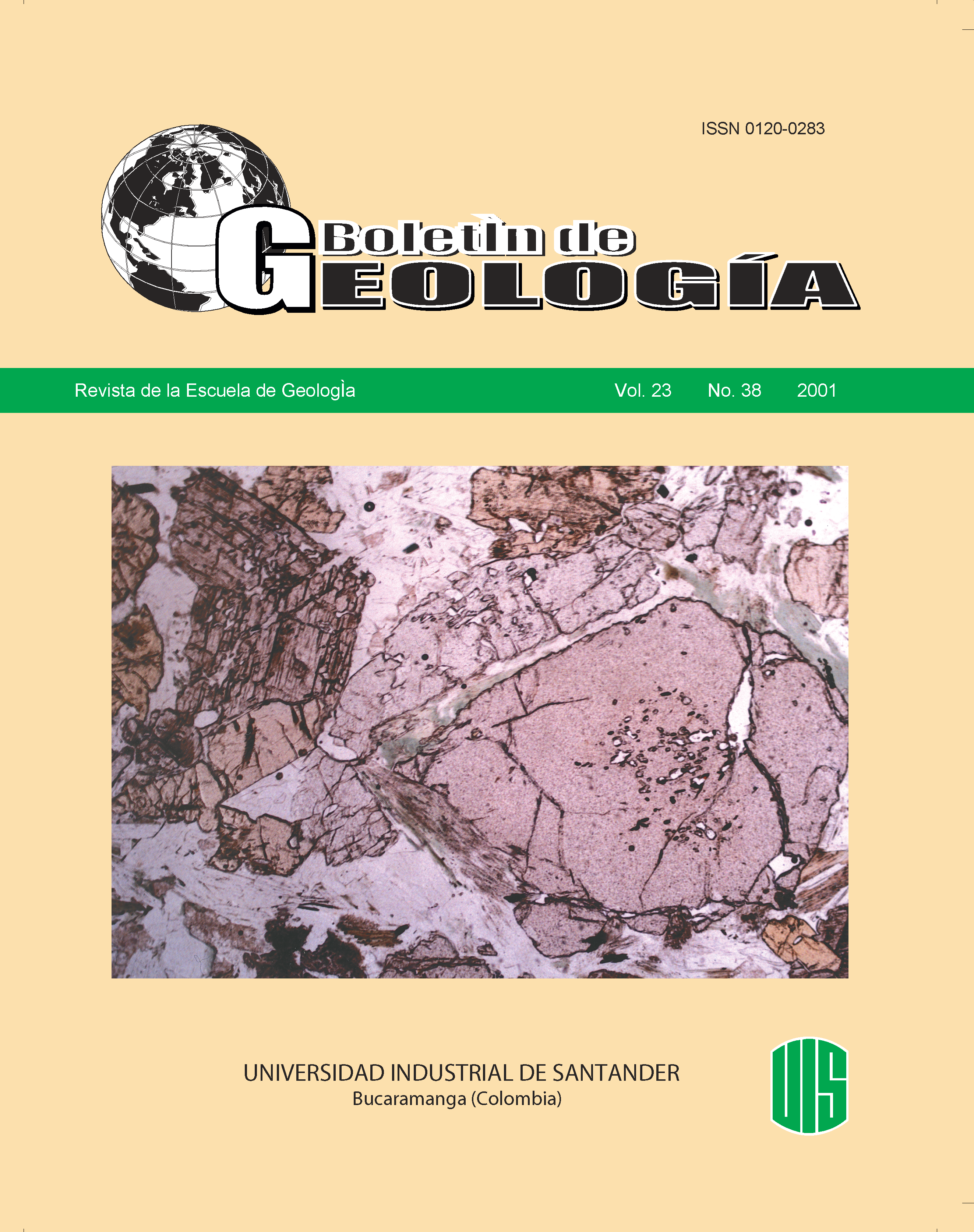Edades por trazas de fisión de circones provenientes de la Formación Saldaña, Valle Superior del Magdalena
Published 2001-10-02
Keywords
- fission track,
- thermochronology,
- Upper Magdalena Valley,
- Colombia,
- Saldaña Formation
How to Cite
Abstract
Fission track analyses were done on ditch cutting and core samples from wells 1A, Suarez-1 and Dina 12 drilled in the Upper Magdalena Valley. In 1A well: a population of crystals of Devonian-Carboniferous age (356±16 Ma to 395±15 Ma) occurs with a population of crystals of Early Cretacic age (137±6 Ma). In the Suarez-1 well zircons of Early Cretacic age (135.0 ± 5 Ma) were found. Finally, it was found in Dina 12 well a population of crystals of Early Cretacic age (141± 5 Ma) mixed with Tertiary crystals. Fission track ages between 137 and 141 Ma, are in agreement with published ages for the Saldaña Formation. Track retention in zircon indicates that, at least, from the Jurassic the sedimentary sequence has not been affected by thermal events over 210±20°C (maximum temperature of retention track range in zircon according to Zaun and Wagner, 1985).
Downloads
References
Aspden, J. A., McCourt, W. J., Brook, M. (1987).Geometrical control of subduction-relatedmagmatism: the Mesozoic and Cenozoic plutonichistory of Western Colombia. J. of the Geol. Soc.London, Vol. 144, pp. 893-905.
Aspden, J. A., Litherland, M. (1992). The geology andMesozoic collisional history of the Cordillera Real,Ecuador. Tectonophysics, Vol. 205, pp. 187-204
Balkwill, H.R. et al. (1995). Northern part of OrienteBasin, Ecuador: Reflection of seismic structures. In:Tankard, A.J., Suárez, S., and Welsink, H.J. Eds.Petroleum Basins of South America. AAPG Memoir,No. 62, pp. 559-571
Bayona, G. A., García, D. F., Mora, G. (1994). LaFormación Saldaña: producto de la actividad deestratovolcanes continentales en un dominio deretroarco. Estudios geológicos del Valle Superior delMagdalena. U. Nal. Bogotá. pp I 1-21
Brandon, M. T. (1992). Decomposition of fission-track grain-age distribution. Am. J. Sci., Vol. 292,pp. 535-564.
Brook, M. (1984). New radiometric age data fromSW Colombia. Reporte Técnico 10 Ingeominas-Misión Británica. pp
Burke, K., Copper, C., Dewey, J. F., Mann, P., Pindell,J. L. (1984). Caribbean tectonics and relative platemotions. Geol. Soc. Am. Mem. Vol. 162, pp. 31-63
Burkley, L. A. (1976). Geochronology of the centralVenezuelan Andes (PhD thesis) Cleveland, CaseWestern Reserve University, 150 p
Cediel, F., Macia, C., Mojica, J. (1981). LasFormaciones Luisa, Payandé, Saldaña sus columnasestratigráficas características. Geología Norandina,No. 3, pp. 11-20.Cediel, F., Macia, C., Mojica, J. (1980). Definiciónestratigráfica del Triásico de Colombia, Sudamérica,Formaciones Luisa, Payandé y Saldaña. Newsletterson stratigraphy Vol. 9, pp. 73-104.
Espejo, A. C., Etchart, H. L., Cordani, U. G.,Kawashita, K. (1980). Geocronología de intrusivasácidas en la Sierra de Perijá, Venezuela: Repúblicade Venezuela. Ministerio de energía y Minas. Boletínde Geología, No. 14, pp. 245-254.
Galbraith, R. F., Green, P. F. (1990). Estimating thecomponent ages in a Finite Mixture. Int J. Radiat.Appl. Instrum. part D., No. 17, pp. 197-206
Galbraith, R. F., Laslett, G. M. (1993). Statisticalmodels for mixed fission track ages. Nucl. TracksRadiat. Meas. No. 21, pp. 459-470.
Galbraith, R. F. (1989). The radial plot: graphicalassessment of spreads in ages. Int. J. Radiat. Appl.Instrum, Part D. No. 17, pp. 207-214
Green, P. F. (1981). A new look at statistics in fission-track dating, Nucl. Tracks, No.5, pp. 77-86
Guerrero, B., Tamara, A. (1982). Petrografía de losintrusivos Triásico - Jurásico y sus relaciones con laFormación Saldaña, al occidente de Dolores, Tolima.Trabajo de grado no publicado. U. Nal Bogotá, 63p
Hurford, A.J. (1990). Standardization of fission trackdating calibration: Recommendation by fission trackworking group of the I.U.G.S. Subcommission ongeochronology. Chem. Geol. (Isotope Geosci.Section), Vol. 80, pp. 171-178.
Jaramillo, L., Escobar, R., Vesga, C. (1980). EdadesK/Ar de rocas con alteración hidrotermal asociadasal sistema de pórfidos de Cobre y Molibdeno deMocoa, Intendencia del Putumayo, Colombia.Geología Norandina, No. 1, pp. 11-18
Kohn, B. P., Shagan, R., Banks, P. O., Burkley, L. A.(1984). Mesozoic - Pleistocene fission track ages onrocks of the Venezuelan Andes and their tectonicimplications. In: Bonini, W.E., Hargraves, R.B
